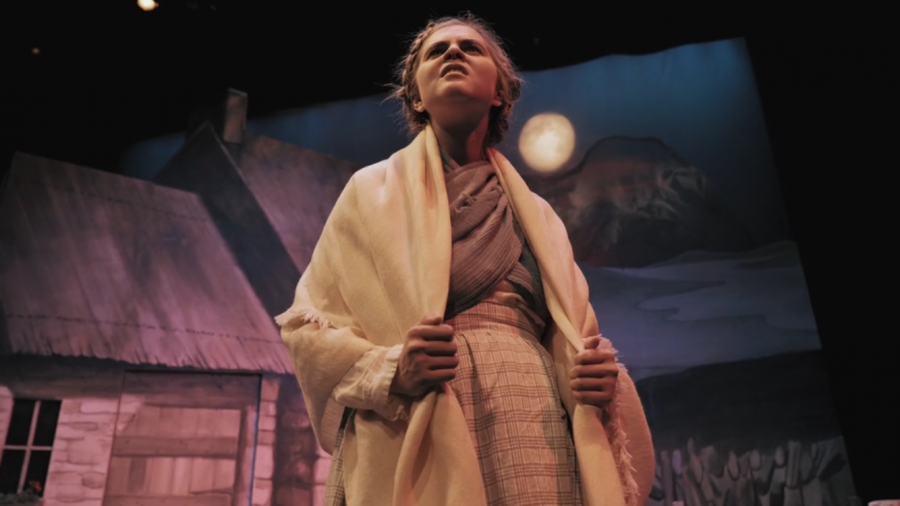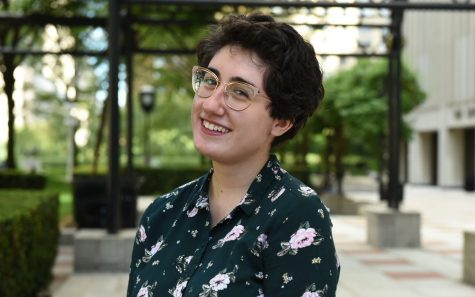Rising Senior Makes Off-Broadway Debut
July 29, 2019
Some theatre students hone their craft in hopes of landing a part on or off Broadway — and some reach that goal before their studies have even finished. Performance major McKenna Harrington, Fordham College at Lincoln Center ’20, just finished her run in Micheál Mac Liammóir’s “The Mountains Look Different” on Theatre Row. Her role as the young farmgirl Bridin marked her off-Broadway debut. The production was mostly acclaimed by critics, and Harrington’s performance was called a “standout.”
“Mountains” is set in 1940s Dublin, where a woman named Bairbre returns from London with a husband. Upon meeting her new father-in-law, she discovers he had paid for her services while she was a prostitute in London and from there, “hellfire rains down,” according to Harrington. Her character, the young farmgirl Bridin, and a farmhand are the focus of the show’s subplot, and her relationship with Bairbre is central to the emotional core of the show.
“I think she’s [Bairbre’s] so, so glamorous,” Harrington said. “She wears clothes I’ve never seen before, and I talk about her ‘silky stockings and leather gloves’ and all of that.
“She kind of tries to warn me about what she did wrong. She has this line like, ‘It doesn’t matter what you do, it’s all going to turn out badly in the end.’ It’s a comedy, if you can tell. No, it’s not. Dark, Irish tragedy.”
Now that the show’s run has ended, Harrington sat down to look back on the experience, the Fordham symposium that led to her audition, and the connection between her acting career and the time she brought whiskey to elementary school.
The Observer: What made you want to get into acting?
McKenna Harrington: I love the same feeling I had on the playground when we were playing make-believe games. I would get really, really obsessed with certain characters from books or movies, and then I would decide that I was that character. When “Narnia” came out, I decided I was going to be Lucy. I cut my hair in a bob. I got in trouble because … she carries around a knife and that serum that makes people come alive again. To school, one day in Mexico, I brought a kitchen knife—which was less of a problem—but I also brought this little bottle that I had gotten in the kitchen, and it had a holster. That’s why I took it; it was exactly like what Lucy had in Narnia. I went around, I made my friends “die” and I would go and give them little drops of what turned out to be whiskey! I don’t really know, but somewhere along the line, I was like, “You can make money doing this? Alright!”
TO: How and when did you first hear about the audition for “Mountains?”
MH: It was my sophomore year; I thought I was going to study abroad in Ireland my junior year. So one day, there was this symposium on the bottom floor of McMahon about this Irish playwright, and it was being hosted by the Irish Studies program. They had a roundtable there of the director and some of the actors from a show that was running with this [Mint] theatre company. The lead actor of that show was there and he was from Dublin, and he said he went to Trinity, and I had been interested in studying at Trinity College, Dublin. After he was done, I went up and talked to him.
Long story short, I ended up going to Mexico; I don’t go to Ireland to study abroad. But I come back from Mexico, it’s January of this year and I see on Playbill.com that there’s this posting — I recognize the theatre company first, it’s the Mint. Then I saw that the director was Aidan Redmond, who was the actor who I’d talked to. I looked him up on Facebook a few days later, just to see what would happen, and he responded. I sent him this long message and was like, ”Hey, we met at Fordham, I see you’re directing this play, there’s a part for a 16-year-old girl; can I audition?” And he said yes! And the rest is history.
TO: How did you all go about making this play from the 1940s accessible to modern audiences?
MH: Part of the reason the director and assistant director decided that this was the right time to do the show was that it’s a very female-driven drama. A lot of plays were not female-driven — still aren’t. Also, the subject matter itself, with the #MeToo movement, it was eerily relevant. Some of the lines, some of the ways things were being said, some of the ways [Bairbre] was being treated. In 1940s Ireland, when it premiered in Dublin, it was very poorly received because … you’re sympathizing with the prostitute. It has not been performed since then, as far as we know. So this is the U.S. premiere, but it was also the first time it’s been performed since the premiere.
TO: Did you already know how to do an Irish accent, or did you have to learn it when you got the role?
MH: I thought I knew how to do it! I knew that I wasn’t very good, but I spent the whole time preparing for the audition trying to get the accent right. So I had family friends who live in Ireland, and I sent the wife the side and she said my lines to me in a voice memo … and I listened to it over and over again, I played it while I was sleeping, just anything to try and get it in my head.
I thought it was decent by the time I went in. Now I know it was not, but I did well enough that it got me the part! But I probably had the worst Irish accent of anyone in the cast because everyone else was either from Ireland, had Irish family that was from Ireland or has been in so many Irish plays that their dialect is already very good. We had a dialect coach that we met on the first day and we had this workshop, breaking down the phonetics of each line. I say “we”; we had private lessons with the dialect coach, but it was really just me who had private sessions with the dialect coach.
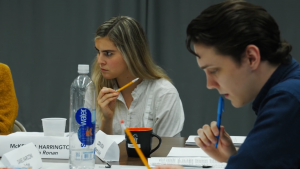
Harrington in rehearsal for “Mountains.”
TO: How long was the rehearsal process?
MH: We actually only rehearsed for about three weeks, and then we went into previews for four weeks, so we had long previews, and then we had opening night. Opening night was June 20, because our previews started May 30. During previews, we were allowed to be called in to rehearse, so sometimes we’d do the show, and then we’d get called into rehearse, and then we’d change blocking or something, and that night the show would be different than it was the night before.
It didn’t change that much, but I had a couple family members who saw the opening-of-previews night. None of the actors had people there because that’s a thing, you don’t invite people you know, but I didn’t know that! I’m used to studios and mainstages where it’s like, you only have three or six performances so you’d better invite them when you can. So a ton of people saw it the first night, which is just so funny because if they had seen it Sunday, the day we closed, I think it would have looked a lot different.
TO: Did anything from your Fordham Theatre education thus far particularly help you while preparing for this role?
MH: Freshman year, I asked Dawn Saito how to cry, which was probably the most amateur move I could ever make. I think it was for a studio show I was in. She was like, in her very ethereal way, “Oh, crying, it’s just breathing.” She showed me that it’s all controlled by breath — it doesn’t matter if there’s tears coming out of your eyes, it’s more about your breath control. So my two big scenes … the first one was almost the only comedic scene in [“Mountains”] because it was quippy and flirty with the farmboy. And the next one, I just came out because I had just seen a dead body burned, and the waterworks were on. The breathing thing helped with that. I didn’t want to think about a dead body every time I had to cry.
TO: What about your character resonated with you?
MH: In my and Bartley the farmhand’s scene, we have this moment together; they’re flirting. He says, “You’ve great notions, haven’t you?” And I say, “Why wouldn’t I have? Haven’t my father threescore pounds in store for me?” That stood out to me. It’s pretty presumptuous of a younger girl to say, “Why wouldn’t you want to marry me, dude? I’ve got a lot more money than you have. My dowry is quite big, but you would count yourself lucky to marry me.” There was that and a couple of other lines that made me think, this girl is really tough. She’s not a wilting violet; she’s got some agency. I don’t usually consider pastoral farmgirls in early 20th-century plays to be written as feisty characters, so I don’t know if it was intended that way, but that’s how I tried to do it.
Dramatically, my character’s role was to be, like, a “little Bairbre.” She says she left for London when she was 16, and I’m 16, and I’m very precocious. I [Bridin] think there’s a lot coming for me, I’m very ambitious and I’m probably not very thrilled about being stuck here … I definitely think that I will sometimes talk and talk and talk to establish the energy between me and another person. I don’t shy away from showing my agency in the same way that Bridin does.
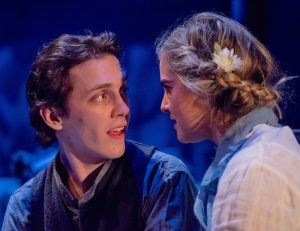
TO: How would you describe the feeling of opening night?
MH: I felt pretty confident, which I usually don’t. I’m usually really nervous before any show. But I remember I had this moment onstage—I don’t remember when—this moment of awareness when I had the thought, “I could just run out and jump off the stage … I could really f— this up.” What I was more nervous about was, how am I going to show up for my call time without being 10 minutes late every single time?
TO: What was the most fun part of participating in this show?
MH: I was really lucky to have the cast members that I did. They were very seasoned, very experienced, and I loved to either sit backstage or sit at the bar after the show and just listen to them talk about all of the shows they had done and been in over the years. I think that was, in general, what was unique about the show—I was the youngest, and I’m 20, and the oldest was late 60s or early 70s. It ran the gamut of experience and where people were in their careers. I wasn’t out of school yet, and there were some people that moved to New York when Broadway was just becoming what it is today. Me and the woman who plays the grandmother character, she and I had the girls’ dressing room to ourselves almost the entire run. We’re still playing Scrabble on our phones together. We just messed around, talked and sometimes napped.
TO: And the most challenging part?
MH: The biggest realization — I guess I knew this, but it was different to feel it — was that this can be a career; it can, but it’s not a traditional career. You don’t get sick days, basically, even if you have understudies, and you kind of don’t get a weekend. You get Mondays, and after a weekend that included a two-show day on Saturday and then a matinee on Sunday … you spend all that time sleeping and grocery shopping. The lifestyle is very different. When you’re in this kind of work, you go, go, go hard for months on end and then you’ll have nothing. It’s very mountains-and-valleys, and I always thought that meant financially or emotionally … but it’s also logistically. You’ll have a lot going on, and then you’ll have nothing. You’ll have a ton of auditions one week, and then you’ll have nothing for two weeks.
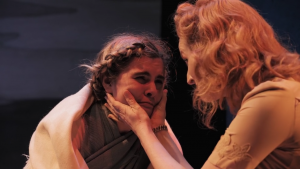
TO: Now that you’ve had this experience, do you look differently at what you want from an acting career?
MH: I almost didn’t really have a specific track in mind because I just wanted to get paid to act in any way that I can. To an extent, that’s still the case. But I think I’m more tuned in to what my options might be. All the other actors have agents and they would be going on auditions during the rehearsal process. Some of them were Broadway auditions, but a lot of them were regional auditions where you’d have to go relocate, and some of them were tours. That’s actually very exciting to me, and I’m glad it is, because it had never occurred to me. I love New York, and I had set myself on, “If I want to do this, this is where I need to be.” But I realized how that’s just not the case. If you want a more stable way of life … you actually would need to leave the city and work at a regional theater that contracted you for years on end.
TO: What’s next for you?
MH: [One of this past semester’s studio shows,] “Dark Play or Stories for Boys,” we’re taking it to Edinburgh Fringe Festival at the end of August. We start rehearsals at the beginning of August. It’s going to be really intense; we’ll rehearse for, like, eight hours for seven days. And then 13 of us are getting on a plane and we’re going to Scotland. I’m psyched.
This interview has been condensed and edited.

